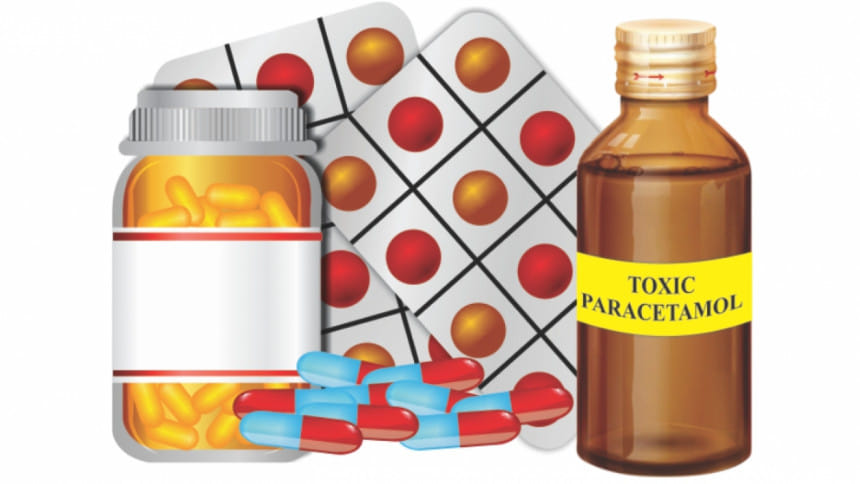Stop production in 7 days

With the health ministry apparently dragging its feet over stopping manufacture of substandard drugs, the High Court yesterday directed the government to halt production of 20 companies within seven days.
The court also ordered closing production of antibiotics by 14 other companies within the same time, and issued a rule upon the authorities concerned to explain in four weeks as to why their inaction in cancelling licences of the 20 drug companies shouldn't be declared illegal.
The bench of Justice Syed Muhammad Dastagir Husain and Justice AKM Shahidul Huq came up with the directives following a writ petition filed by Human Rights and Peace for Bangladesh (HRPB) on June 5.
The HC asked the health secretary and directors general of the Directorate General of Health Services (DGHS), the Directorate General of Drug Administration (DGDA) and the Directorate of National Consumer Rights Protection to submit a report to it within two weeks after complying with the orders.
Besides, the inspector general of police, the DG of Rapid Action Battalion and Bangladesh Association of Pharmaceutical Industries have been made respondents to the rule.
Petitioner's lawyer Manzill Murshid told this correspondent that the rogue drug companies should immediately withdraw all their medicines from the market following the HC order.
“If they don't do so, we will move a petition before the High Court for a directive on them to withdraw their medicines and antibiotics from the market,” he added.
The HRPB filed the writ petition after an expert committee, formed by the parliamentary standing committee on the health ministry in August 2014, recommended revoking the licences of 20 drug companies that repeatedly failed to follow the good manufacturing practices (GMP).
Prof ABM Faruque of Dhaka University's pharmacy department, who headed the expert body, presented the report on 84 drug companies before a meeting of the standing committee on April 20 this year.
According to the report, the drugs manufactured without following the GMP might cause damage to health, and the damage could be fatal.
At a meeting on April 21, the health ministry decided to implement the expert committee's recommendations, but nothing concrete has yet been done to that end.
Talking to this correspondent yesterday, Maj Gen Mustafizur Rahman, director general of the DGDA, said they were in the process of implementing the recommendations. But it was taking time, as the existing law doesn't allow revoking outright the licences of drug companies.
“On the health ministry's instructions, we formed several teams that have inspected the drug companies. Later, we wrote to the companies seeking explanations,” he told this correspondent over the phone.
The HC orders would now help accelerate the process of revoking the licences of the companies at fault, Mustafizur said.
Prof Rashid-e Mahbub, chairman of the National Committee on Health Rights Movement, said the role of the parliamentary body was laudable, but it was unfortunate that the health ministry didn't take prompt actions.
Now that the court has issued directives, the health ministry must immediately seal the factories of the 20 drug companies and order them to withdraw their medicines from the market, he said.
Rashid suggested that the government should publish advertisements in the media, informing people about the substandard drugs produced by these companies.
At yesterday's hearing on the writ petition, Manzill said some pharmaceutical companies, having obtained licences from the government, continued production of low quality medicines.
He said the health ministry's inaction regarding the expert committee's recommendations is a serious violation of the constitution's Article 18 (1), which speaks of raising people's level of nutrition and improving public health.
The 20 drug companies that have to stop production are:
Aexim Pharmaceuticals Ltd, Avert Pharma Ltd, Bikolpo Pharmaceuticals Ltd, Dolphin Pharmaceuticals Ltd, Drugland Ltd, Globe Laboratories (pvt) Ltd, Jalpha Laboratories Ltd, Kafma Pharmaceuticals Ltd, Medico Pharmaceuticals Ltd, National Drug Pharma Ltd, North Bengal Pharmaceuticals Ltd, Remo Chemicals Ltd (Pharma Division), Rid Pharmaceuticals Ltd, Skylab Pharmaceuticals Ltd, Spark Pharmaceuticals Ltd, Star Pharmaceuticals Ltd, Sunipun Pharmaceuticals Ltd, Today Pharmaceuticals Ltd, Tropical Pharmaceuticals Ltd and Universal Pharmaceuticals Ltd.
The 14 companies which must stop manufacture of antibiotics are:
Ad Din Pharmaceuticals Ltd, Alkad Pharmaceuticals Ltd, Belsen Pharmaceuticals Ltd, Bengal Drugs Pharmaceuticals Ltd, Bistol Pharmaceuticals Ltd, Crystal Pharmaceuticals Ltd, Indo Bangla Pharmaceuticals Ltd, Millat Pharmaceuticals Ltd, MST Pharmaceuticals Ltd, Orbit Pharmaceuticals Ltd, Pharmatik Pharmaceuticals Ltd, Phoenix Pharmaceuticals Ltd, Rasa Pharmaceuticals Ltd and Save Pharmaceuticals Ltd.

 For all latest news, follow The Daily Star's Google News channel.
For all latest news, follow The Daily Star's Google News channel. 








Comments